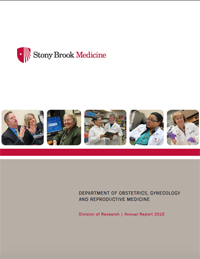
The Division of Research strives to inform the medical community of new research, potential studies, and general updates in the field of Obstetrics, Gynecology, and Reproductive medicine. For more information, see the announcements below.
Division of Research Releases 2021-2022 Annual Report
The Division of Research in the Department of Obstetrics, Gynecology and Reproductive Medicine recently published its annual report. The publication details faculty and staff research activities and publications from 2021-22.
Please download the 2021-2022 Annual Report here for more information.
Division of Research Releases 2019-2020 Annual Report
Posted: February 23, 2021
The Division of Research in the Department of Obstetrics, Gynecology and Reproductive Medicine recently published its annual report. The publication details faculty and staff research activities and publications from 2019-20.
Please download the 2019-2020 Annual Report here for more information.
NCI COVID-19 in Cancer Patients Study with Michael L. Pearl, MD
National Cancer Institute-Support Study
Patients with cancer who also have COVID-19 are eligible to participate. This is not a clinical trial for new treatments.
The purpose of this study is to determine how the interactions of cancer and COVID-19 affects patients' outcomes. Participants will not change treatments r require any additional visits.
For information, call (631) SB-TRIAL (728-7425)
Research article "Patients' preimplantation genetic testing decision- making experience: an option on related psychological frameworks" published by Oxford University Press on the Human Reproduction Open
- Abstract:
- Article (free access):
Human Reproduction Open, Volume 2019, Issue 4, 2019, hoz019
Authors: L M Pastore, C N Cordeiro Mitchelle, L R Rubin, J Nicoloro-SantaBarbara, M C Genoff Garzon, M Lobel
Division of Research Releases 2018-2019 Annual Report
Posted: December 16, 2019
The Division of Research in the Department of Obstetrics, Gynecology and Reproductive Medicine recently published its annual report. The publication details faculty and staff research activities and publications from 2018-19.
Please download the 2018-2019 Annual Report here for more information.
Scientists Awarded $3.2 Million to Improve Delivery Room Decisions
Posted: July 18th, 2019
Here is the link to the full article: https://news.stonybrook.edu/sb_medicine/scientists-awarded-3-2-million-to-improve-delivery-room-decisions/?spotlight=3
Division of Research Releases Annual Report 17-18
Posted: March 12, 2019
The Division of Research in the Department of Obstetrics, Gynecology and Reproductive Medicine recently published its annual report. The publication details faculty and staff research activities and publications from 2017-18.
Please download the Annual Report 17-18 here for more information.
Dr. Lisa Pastore and her colleagues have just published a review article:
“Does theFMR1 gene affect IVF success?” in Reproductive Biomedicine Online.
Here is a link to the full article: https://www.rbmojournal.com/article/S1472-6483(18)30590-X/fulltext
Division of Research Releases Annual Report
Posted: January 31, 2018
The Division of Research in the Department of Obstetrics, Gynecology and Reproductive Medicine recently published its annual report. The publication details faculty and staff research activities and publications from 2016-17.
Please download the report for more information.
New Article: Dr. Lisa Pastore Publishes Key Report on FMR1 Gene in Reproductive Sciences
Posted: February 26, 2016
Research Associate Professor in the department, Lisa Pastore, PhD, has published a key report from her NIH-funded FRAXELLE Study. Among these women with normal reproductive histories, significant FMR1 repeat length differences were found across race-ethnicity for both the longer (p=0.0002) and shorter (p<0.0001) alleles. The trinucleotide length variance was greater for non-Asian than Asian women (p<0.0001), despite identical median values. These data demonstrate that FMR1 distributions do vary by race-ethnicity even within the “normal” range. This study indicates the need to control for race-ethnicity in FMR1 ovarian aging research, and provides race-ethnic population data for females separated by allele.
The historical research on the FMR1 gene has primarily focused on male offspring, and secondarily on the mothers of boys with Fragile X Syndrome (FXS). A growing number of articles are being published on the FMR1 trinucleotide repeat length of women with infertility and/or early ovarian aging outside of FXS families. However, most of those reports have used fertility clinic patients for a comparison group due to the lack of data on the entire CGG repeat range from the general female population. Additionally, little general population data exist on potential race-ethnicity differences or on the individual alleles.
The unique contributions of this article to the literature are: this is the only known article to document the FMR1 CGG repeat distribution by individual allele in unaffected women with normal reproductive histories, and the only known report of race-ethnic variation in the FMR1 CGG repeat lengths in women with normal reproductive histories in the US.
To read the article abstract and for more information on accessing the full text, please refer to Pubmed.gov.

Division of Research Releases Annual Report
Posted: August 24, 2015
The Division of Research in the Department of Obstetrics, Gynecology and Reproductive Medicine recently published its annual report. The publication details faculty and staff research activities and publications from 2014-15.
Please download the report for more information.
Stony Brook MPH Graduate Masra Shameem Wins Fulbright Scholarship
Posted: July 17, 2015
Attending high school in Karachi, Pakistan, Masra Shameem witnessed the disparity in healthcare access between developing nations and the United States. Most striking to her was the lack of education and proactive screening made available to women. This global health issue remained in Ms. Shameem’s mind throughout her education and, most recently, while an MPH student at Stony Brook University. While earning her degree, she sought opportunities to improve women’s healthcare across cultural and economic barriers, joining Dr. Joyce Varughese in the Department of Obstetrics, Gynecology, and Reproductive Medicine to study cervical cancer screening. After beating out thousands of applicants, Ms. Shameem will apply her expertise to analyze cervical cancer screening in Mumbai starting this August with a prestigious Fulbright Scholarship.
Under the guidance of Dr. Dhananjaya Saranath, Executive Director at Cancer Patient Aid Association (CPAA), Ms. Shameem will use her award to analyze the cultural and economic factors affecting Mumbai women and their decisions to undergo cervical cancer screening. According to Ms. Shameem, more women die of cervical cancer in India than in any other country in the world. While most studies focus on screening in rural areas, little is known about the barriers present among metropolitan regions like Mumbai, where one might expect an increase in resources and education. To the contrary, however, a recent study showed that Mumbai women refuse cervical cancer screening even when education and tests are provided gratis. Partnering with the CPAA’s HPV Laboratory Project, which is devoted to providing 5,000 free HPV screenings to women in Mumbai, Ms. Shameem will interact with patients to determine factors that affect their decision to undergo or decline screening. More specifically, her study will investigate questions pertaining to cervical cancer education; social stigmas associated with HPV; autonomy in healthcare decisions amongst Mumbai women; and the correlation between education level, general healthcare behavior, and a willingness to be screened.
I had always hoped to return to developing nations, like Pakistan, to understand the reasons behind health disparities. The Fulbright grant will provide me with this opportunity. However, unlike my experiences in Pakistan in which I was a silent observer, the Fulbright grant allows me to actively investigate a health outcome affecting thousands of women in the developing world
Ms. Shameem hopes her study will enable future physicians and public health administrators to better understand and manage the complicated cultural factors affecting South Asian women and HPV screening. Analyzing and addressing these influences will help the global medical community in decreasing “preventable deaths” caused by cervical cancer and save the lives of the over 100,000 women predicted to die from the disease by 2020. When asked about her study, Ms. Shameem notes, “I had always hoped to return to developing nations, like Pakistan, to understand the reasons behind health disparities. The Fulbright grant will provide me with this opportunity. However, unlike my experiences in Pakistan in which I was a silent observer, the Fulbright grant allows me to actively investigate a health outcome affecting thousands of women in the developing world.”
New Poster: Supplement Information Sources and Consumption in Menopausal Women

Posted: April 27, 2015
Senior Research Support Specialist and Stony Brook University alumna Natalie Crnosija, MPH, participated October 2014 in the 25th Annual North American Menopause Society Meeting (Washington, DC) poster session with the study “Associations between supplement information sources and menopausal women’s consumption of herbal supplements”. With Dr. David Baker, MD, and Research Coordinator, Elizabeth Roemer, MA, Ms. Crnosija examined the association between the supplement information source used (i.e., healthcare provider, the Internet, a health store) and the one-time consumption of an herbal supplement (i.e. black cohosh, ginko biloba, evening primrose, ginseng). Results showed that participants who consulted a healthcare provider had a reduced odds of consuming an herbal supplement once relative to those who did not consult a healthcare provider.
Please read Ms. Crnosija's poster Annual Report 17-18r to the FDA’s Q&A webpage about Dietary Supplements for more information.

